|
De Engelse dichter en schrijver Roger Joseph McGough werd geboren op 9 november 1937 in Litherland, Lancashire. Zie ook mijn blog van 9 november 2008 en ook mijn blog van 9 november 2009.
xml:namespace prefix = o ns = "urn:schemas-microsoft-com:office:office" />
First Day at School
A millionbillionwillion miles from home
Waiting for the bell to go. (To go where?)
Why are they all so big, other children?
So noisy? So much at home they
Must have been born in uniform
Lived all their lives in playgrounds
Spent the years inventing games
That don't let me in. Games
That are rough, that swallow you up.
And the railings.
All around, the railings.
Are they to keep out wolves and monsters?
Things that carry off and eat children?
Things you don't take sweets from?
Perhaps they're to stop us getting out
Running away from the lessins. Lessin.
What does a lessin look like?
Sounds small and slimy.
They keep them in the glassrooms.
Whole rooms made out of glass. Imagine.
I wish I could remember my name
Mummy said it would come in useful.
Like wellies. When there's puddles.
Yellowwellies. I wish she was here.
I think my name is sewn on somewhere
Perhaps the teacher will read it for me.
Tea-cher. The one who makes the tea.
Cake
I wanted one life
you wanted another
we couldn't have our cake
so we ate eachother.
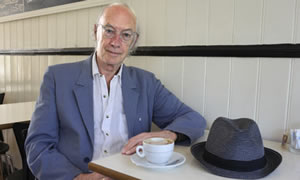
Roger McGough (Litherland, 9 november 1937)
De Belgische humorist, cabaretier en schrijver Raymond Devos werd geboren in Moeskroen op 9 november 1922. Zie ook mijn blog van 9 november 2008.
Uit: Parler pour ne rien dire
Mesdames et messieurs ... Je vous signale tout de suite que je vais parler pour ne rien dire. Oh! je sais! Vous pensez : "S'il n'a rien à dire ... il ferait mieux de se taire!"
Evidemment! Mais c´est trop facile! ... c´est trop facile! Vous voudriez que je fasse comme tout ceux qui n´ont rien à dire et qui le garde pour eux? Eh bien non! Mesdames et messieurs, moi, lorsque je n'ai rien à dire, je veux qu'on le sache! Je veux en faire profiter les autres! Et si, vous-mêmes, mesdames et messieurs, vous n´avez à rien dire, eh bien, on en parle, on en discute!
Je ne suis pas ennemi du colloque. Mais, me direz-vous, si on en parle pour ne rien dire, de quoi allons-nous parler? Eh bien, de rien! De rien! Car rien ... ce n'est pas rien! La preuve c'est qu'on peut le soustraire.
Exemple: Rien moins rien = moins que rien! Si l´on peut trouver moins que rien c´est que rien vaut déjà quelque chose!
On peut acheter quelque chose avec rien! En le multipliant Une fois rien ... c´est rien Deux fois rien ... c´est pas beaucoup! Mais trois fois rien! ... Pour trois fois rien on peut déjà acheter quelque chose! ... Et pour pas cher!
Maintenant si vous multipliez trois fois rien par trois fois rien : Rien multiplié par rien = rien. Trois multiplié par trois = neuf. Cela fait rien de neuf!
Oui ... ce n´est pas la peine d´en parler! Bon! Parlons d´autres choses! parlons de la situation, tenez! Sans préciser laquelle! Si vous le permettez, je vais faire brièvement l´historique de la situation, quelle qu'elle soit!
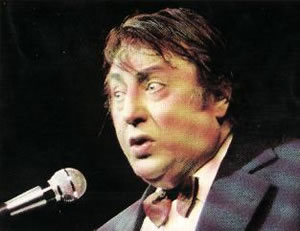
Raymond Devos (9 november 1922 - 15 juni 2006)
De Indische dichter en schrijver Mohammed Iqbal werd geboren op 9 november 1877 in Sialkot in het tegenwoordige Pakistan. Zie ook mijn blog van 9 november 2006 en ook mijn blog van 9 november 2008.
Bright are Thy tresses, brighten them even more
Bright are Thy tresses, brighten them even more,
And ravish my eyes, ravish my mind, ravish my heart and soul.
That love should be concealed, and beauty should be veiled!
Reveal Thyself to me, O Lord, or reveal me to myself.
Thou art the eternal ocean; I am a rivulet.,
Make me a part of Thee, O Lord, or make me fathomless.
If I possess a pearl within, give it a starry lustre,
But if I am a piece of brick, give it a diamond's sheen.
If of spring I cannot sing as a bird of paradise,
Make this half-enrapturcd soul a skylark of Thy spring.
Vertaald door Naeem Siddiqui
The child's invocation
My longing comes to my lips as supplication of mine
O God! May like the candle be the life of mine!
May the world's darkness disappear through the life of mine!
May every place light up with the sparkling light of mine!
May my homeland through me attain elegance
As the garden through flowers attains elegance
May my life like that of the moth be, O Lord!
May I love the lamp of knowledge, O Lord!
May supportive of the poor my life's way be
May loving the old, the suffering my way be
O God! Protect me from the evil ways
Show me the path leading to the good ways
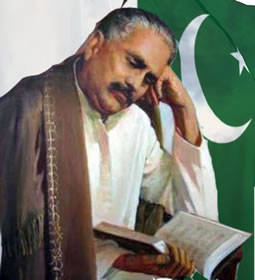
Mohammed Iqbal (9 november 1877 21 april 1938)
De joods-Hongaarse schrijver Imre Kertész werd geboren op 9 november 1929 in Boedapest. Zie ook mijn blog van 9 november 2006 en ook mijn blog van 9 november 2008.
Uit: Roman eines Schicksallosen (Vertaald door Christina Viragh)
Heute war ich nicht in der Schule. Das heißt doch, ich war da, aber nur, um mir vom Klassenlehrer freigeben zu lassen. Ich habe ihm das Schreiben meines Vaters überbracht, in dem er wegen «familiärer Gründe» um meine Freistellung nachsucht. Der Lehrer hat gefragt, was das für familiäre Gründe seien. Ich habe gesagt, mein Vater sei zum Arbeitsdienst einberufen worden; da hat er weiter keine Schwierigkeiten gemacht.
Ich bin losgeeilt, aber nicht nach Hause, sondern gleich zu unserem Geschäft. Mein Vater hatte gesagt, sie würden mich dort erwarten. Er hatte noch hinzugefügt, ich solle mich beeilen, vielleicht würden sie mich brauchen. Eigentlich hat er mir gerade darum freigeben lassen. Oder vielleicht, um mich «an diesem letzten Tag an seiner Seite zu wissen», bevor er «seinem Zuhause entrissen wird»: denn auch das hat er gesagt, allerdings, ja, zu einem anderen Zeitpunkt. Er hat es, wenn ich mich recht erinnere, zu meiner Mutter gesagt, als er am Morgen mit ihr telefonierte. Es ist nämlich Donnerstag, und an diesem Tag und sonntags hat strenggenommen meine Mutter Anrecht auf meinen Nachmittag. Doch mein Vater hat ihr mitgeteilt: «Es ist mir heute nicht möglich, Gyurka zu dir hinüberzulassen» und hat das dann so
begründet. Oder vielleicht doch nicht. Ich war heute morgen ziemlich müde, wegen des Fliegeralauns in der Nacht, und erinnere mich vielleicht nicht richtig. Aber daß er es gesagt hat, da bin ich sicher. Wenn nicht zu meiner Mutter, dann zu jemand anderem.
Ich habe dann mit meiner Mutter ebenfalls ein paar Worte gewechselt, worüber, das weiß ich nicht mehr. Ich glaube, sie war mir dann auch ein wenig böse, denn wegen der Anwesenheit meines Vaters blieb mir nichts anderes übrig, als mit ihr etwas kurz angebunden zu sein: schließlich muß ich mich heute nach ihm richten. Als ich schon im Begriff war aufzubrechen, hat auch meine Stiefmutter noch ein paar vertrauliche Worte an mich gerichtet, im Flur, unter vier Augen. Sie hat gesagt, sie hoffe, an diesem für uns so traurigen Tag bei mir «mit einem angemessenen Verhalten rechnen zu können». Ich wußte nicht, was ich da hätte sagen sollen, und so habe ich nichts gesagt.
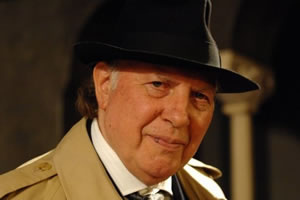
Imre Kertész (Boedapest, 9 november 1929)
De Amerikaanse schrijver, astronoom en populariseerder van de wetenschap Carl Edward Sagan werd geboren in New York op 9 november 1934. Zie ook mijn blog van 9 november 2008.
Uit: The Varieties of Scientific Experience: A Personal View of the Search for God
If we are to discuss the idea of God and be restricted to rational arguments, then it is probably useful to know what we are talking about when we say "God." This turns out not to be easy. The Romans called the Christians atheists. Why? Well, the Christians had a god of sorts but it wasn't a real god. They didn't believe in the divinity of apotheosized emperors or Olympian gods. They had a peculiar, different kind of god. So it was very easy to call people who believed in a different kind of god "atheists". And that general sense that an atheist is anybody who doesn't believe exactly as I do prevails in our own time.
Now, there is a constellation of properties that we generally think of when we in the West or more generally in the Judeo-Christian-Islamic tradition, think of God. The fundamental differences among Judaism, Christianity, and Islam are trivial compared to their similarities. We think of some being who is omnipotent, omniscient, compassionate, who created the universe, is responsive to prayer, intervenes in human affairs, and so on.
But suppose there were definitive proof of some being who had some but not all of these properties. Suppose somehow it were demonstrated that there was a being who originated the universe but is indifferent to prayer. Or, worse, a God who was oblivious to the existence of humans. That's very much like Aristotle's God. Would that be God or not? Suppose it were someone who was omnipotent but not omniscient or vice versa. Suppose this God understood all the consequences of his actions but there were many things he was unable to do, so he was condemned to a universe in which his desired ends could not be accomplished. These alternative kinds of gods are hardly ever thought about or discussed. A priori there is no reason why they should not be as likely as the more conventional sorts of gods.
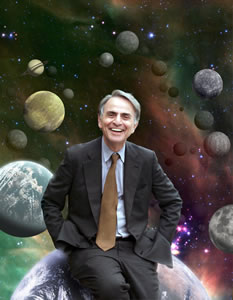
Carl Sagan (9 november 1934 20 december 1996)
|



